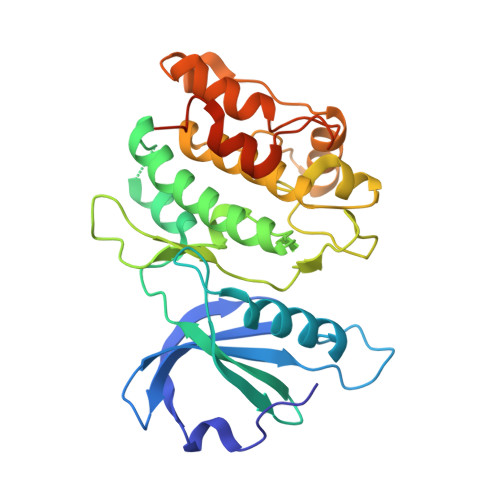Structural Insight into the Interactions between Death-Associated Protein Kinase 1 and Natural Flavonoids.
Yokoyama, T., Kosaka, Y., Mizuguchi, M.(2015) J Med Chem 58: 7400-7408
- PubMed: 26322379
- DOI: https://doi.org/10.1021/acs.jmedchem.5b00893
- Primary Citation of Related Structures:
5AUT, 5AUU, 5AUV, 5AUW, 5AUX, 5AUY, 5AUZ, 5AV0, 5AV1, 5AV2, 5AV3, 5AV4 - PubMed Abstract:
Death-associated protein kinase 1 (DAPK1) is a 160 kDa serine/threonine protein kinase that belongs to the Ca(2+)/calmodulin-dependent protein kinase subfamily. DAPK1 is a possible target for the treatment of acute ischemic stroke and endometrial adenocarcinomas. In the present study, we investigated the binding characteristics of 17 natural flavonoids to DAPK1 using a 1-anilinonaphthalene-8-sulfonic acid competitive binding assay and revealed that morin was the strongest binder among the selected compounds. The crystallographic analysis of DAPK1 and 7 selected flavonoid complexes revealed the structure-binding affinity relationship in atomic-level detail. It was suggested that the high affinity of morin could be accounted for by the ionic interaction between 2'-OH and K42 and that such an interaction would not take place with either cyclin-dependent protein kinases or PIM kinases because of their broader entrance regions. Thus, morin would be a more selective inhibitor of DAPK1 than either of these other types of kinases. In addition, we found that the binding of kaempferol to DAPK1 was associated with a chloride ion. The present study provides a better understanding of the molecular properties of the ATP site of DAPK1 and may be useful for the design of specific DAPK1 inhibitors.
Organizational Affiliation:
Faculty of Pharmaceutical Sciences, University of Toyama , 2630 Sugitani, Toyama 930-0914, Japan.
















